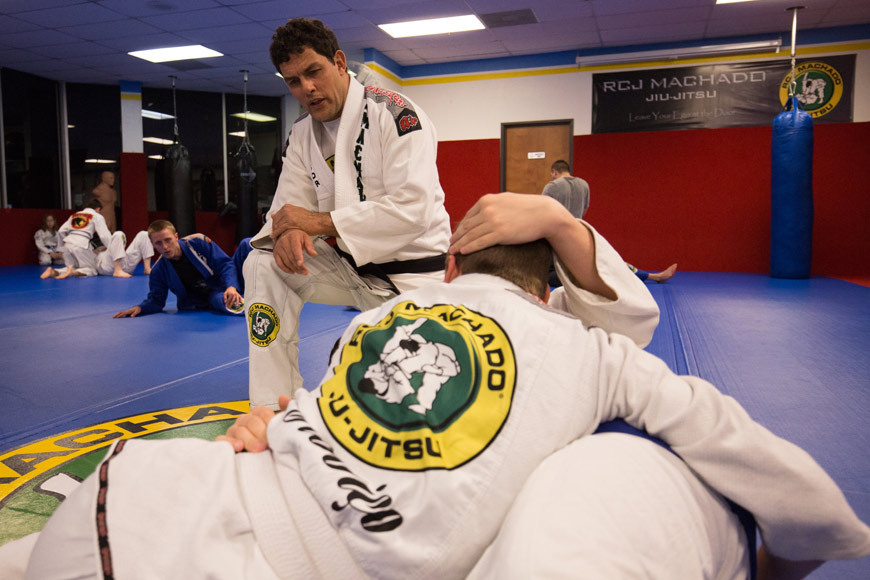
Jiu-Jitsu and Capoeira professor Marcio Santos poses for a photograph at RCJ Machado Jiu-Jitsu February 1, 2016. The 3rd degree black belt holder posseses more than 30 years of experience, teaching the art forms to kids and adults. (Photo by Rasy Ran)
Perched behind his desk at Lake Highlands’ RCJ Machado Jiu-Jitsu studio, wire-rimmed glasses on his nose, piles of paperwork at his fingertips and a rescued Chihuahua mix named Rocky at his feet — Marcio Santos has come a long way since his days as a rebellious teenager picking fights on the streets of Rio de Janeiro.
Racism and segregation beleaguered his Brazilian barrio in those days, he says, his accent distinct despite more than a decade in the United States. But it wasn’t entirely bad — after all, a skirmish with a black classmate opened the door to capoeira, a martial art that would become a lifelong passion, and the culture surrounding it.
Though Santos since age 4 had practiced jiu-jitsu, a “gentle sport” rooted in tenets like self-discipline and humility, he was a feisty teenager with a short fuse.
After one street fight, he chased his opponent to a house in a nearby neighborhood. There, he met his rival’s relative, who happened to be an instructor at the local capoeira studio.
“He talked me out of fighting, and into trying out his class,” Santos recalls.
Santos instantly loved capoeira — a centuries-old sport that combines music and acrobatics with self-defense. He bolted home to tell his father about his newfound interest. But his dad balked.
“He said that capoeira was for black people, for the poor, that he would not pay for classes or even allow me to go to them,” he says.
So Santos attended in secret.
“I went back and told the instructor about my father and that I couldn’t pay, and he let me take his classes for free.”
His older brother eventually found out and told on him, but by then he was hooked; no one could stop him.
While he and his brother were still teenagers, Santos’ father died.
Jiu-jitsu and capoeira practice provided comfort during those years, as he grieved.
While some other kids in his neighborhood turned to drugs or gangs, Santos spent all of his extra time training, eventually earning a third-degree black belt in Brazilian jiu-jitsu and the rank of professor in capoeira.
[quote align=”right” color=”
#38b6d5 “]“The moment you step on the mat you forget about the stresses of life. Problems at home all go away.”[/quote]
Martial arts are more than an exercise or a way to fight or defend oneself, Santos says.
“They are all of those things, but they also are something like a religion and a community. In the choice between healthy living and bad stuff, it is the positive choice. The moment you step on the mat you forget about the stresses of life. Problems at home all go away.”
On a Monday night the school is a church where surgeons, sheriffs, lawyers, teachers and school principals, children and others of varying ethnicities and socioeconomic backgrounds gather, mingle, grapple, hug, bowing in reverence as they step on the mat. Stephen and Amy Yearout enrolled each of their three children at about age 5. Stephen wants his boys to know how to defend themselves without punching. “I can’t always be there and I want them safe and confident,” he says. And jiu-jitsu doesn’t involve the types of violent kicks and jabs that might get one suspended or fined. He adds that when it comes to children and women, jiu-jitsu is the preferred martial art, because it renders size less relevant. “Whether you are a woman or a smaller person, these are skills that allow you to fight for your life, even if you are taken to the ground by a person my size (he’s a big guy), if you ever needed to,” Stephen says.
Jeff Lankford, in raising four children now ages 12-21, has dealt with more coaches than he can count, he says, but Santos is the best teacher he has ever met.
Students refer to their classmates time and again as “family.”
Santos’ jiu-jitsu instructor and mentor, Carlos Machado, is a member of the world’s most renowned jiu-jitsu family — the Machados are credited with introducing the practice to the United States. Carlos Machado opened a string of Brazilian jiu-jitsu schools and Santos owns the Lake Highlands franchise.
Today Santos and Machado are not only business partners but also best friends who regularly lunch together and engage in long, animated conversations in Portuguese about coaching and the industry.
When asked why he came to America, Machado answers with a word, “Destiny.”
Santos is more pragmatic when explaining why he followed the Machados here. He wanted to make a living doing what he loves — teaching martial arts — and the economics back home just didn’t work.
Brazil was saturated with martial arts schools, Santos says, but the professors worked more for the love of the sport than money. Santos cites his beloved capoeira teacher, who taught him gratis, as an example.
Machado, revered in the jiu-jitsu world, has nothing but admiration for Santos.
“He is an outstanding individual — patient and caring and has a sense of humor. He provides such a friendly environment, I do not think it is uncommon for people at his school to become good friends,” Machado says of his mentee. Though Santos has been training more than 30 years and teaching more than 10, he says he prefers the title Mister to Master. Master implies that he has learned everything, he says, and he isn’t close. “I have something new to learn every single day,” he says.





